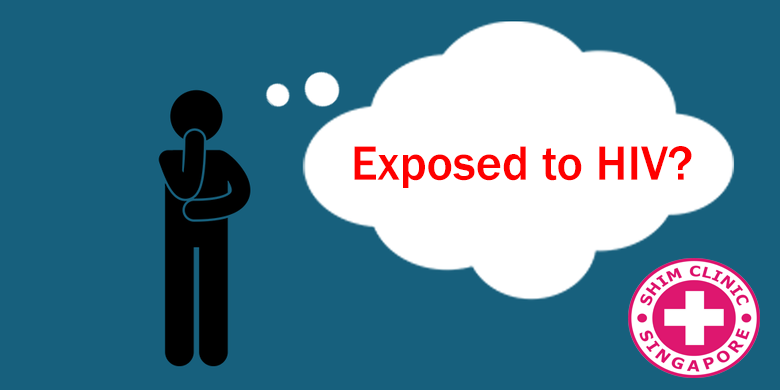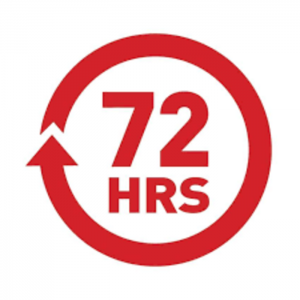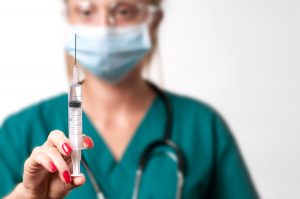What should you do?
You’re a bit confused because you think you’ve been exposed to HIV. It could be during a sexual intercourse, or because you walked on a needle. It could be at work or during a sexual assault.
While there are many different ways of being exposed to HIV, there is only one single way of handling it: through HIV testing and by taking antiretroviral medicine (also called PEP when taken after exposure to HIV).
Even the slightest doubt of getting exposed to HIV is enough to justify getting PEP medicine and making sure you’re not infected. You should get your PEP treatment within 72 hours, otherwise you will not get its benefits. And as time passes, your chances of PEP working diminishes.
Once you start taking PEP, you’ll have to take it only once or twice per day for a whole month. That’s a cheap price to pay to avoid getting infected by HIV in case you’ve been exposed!
But remember that you should be ready for the best and the worst. PEP does not have a 100% success rate. PEP can fail.
If you already know that you should take PEP, then here’s a list of tips to take PEP and get the most out of it.
Should you take PEP?
That’s a question you should ask yourself whenever you get exposed to HIV. Even if you think it’s a bit unnecessary, you cannot guess whether or not you’ve really been exposed and potentially infected by HIV.
Therefore, to answer this question, you should take PEP if:
- You’re HIV-negative or don’t know your HIV status
- You’ve been exposed:
- During sexual intercourse
- Through blood contact
- You were sexual assaulted
If your situation matches both (1) and any of (2), then PEP is definitely for you. But you should understand that PEP is not a replacement for established methods for preventing HIV such as PrEP (pre-exposure prophylaxis) or condoms. These methods are meant to be used before any exposure happen, and they’re much more efficient at preventing a potential infection than any PEP treatment.
PEP is something you have to take when you may have been infected, whereas PrEP is something you take on a daily basis to reduce your chances of infection.
If you’re a health care worker, should you get PEP as well?
The answer is a big YES! Health care workers are not particularly prone to being infected by HIV through their work, but it doesn’t happen and it shouldn’t be ignored. You’re not immune to the disease and you should get treated and HIV tested as well.
It’s not because you’re “used to it” that it won’t happen. Never underestimate HIV exposure and always go through HIV testing and PEP after exposure.
If you’re a clinician and believe that one of your health care workers have been exposed to HIV, reach immediately your local HIV prevention center by calling them.
Will you experience side effects when taking PEP?
While taking PEP is not dangerous or life-threatening per se, it’s important to note that nausea is a common side effect. If you experience nausea, it doesn’t mean that you’re infected with HIV, but that you’re experiencing one of PEP’s side effects. If you want to get a full list of potential HIV symptoms, you can check this article.
You should know that PEP may interact with other drugs. Since it’s on an individual basis and also based on which medications you take, you need to read check potential drug reactions with a doctor.
Where can I receive PEP?
Any health care provider in your area, emergency room or STD clinic can prescribe you PEP if you provide them valid reasons. That’s their job to help you get tested and get your PEP treatment for HIV exposure. Remember, you should be extremely quick and talk to them within 72 hours to get the best out of PEP.
There are also specialized clinics that handle emergency situations and disease exposure. For example, if you’re based in Singapore, you can go directly to the Shim Clinic and get HIV testing within 20 minutes. They’re not very expensive compared to the services they provide, and you can check their fees here.
Can you get PEP each time you have unprotected sex?
You can get PEP each time you have unprotected sex, but it’s not the best way to avoid getting infected by HIV. PEP doesn’t have a 100% effective rate, and it’s not something that can be taken routinely like PrEP. It means that if you don’t take precautions and get exposed often, you’ll get infected at some point even if you use PEP systematically.
It’s particularly clear when we see cases where HIV becomes resistant to drugs, such as the case discovered in the Philippines.
If you’re often exposed to HIV (for example a sex worker), you should take PrEP and use condoms as a preventive mean to avoid getting infected. It’s better to carefully prevent getting exposed and infected than to deal with exposure and PEP treatments.
Conclusion
If you’ve read this article carefully, you know understand that there are two things that can’t be tolerated when you get exposed to HIV:
- Doing nothing
- Waiting
If you do nothing, then you may lose a chance to avoid getting infected by HIV. And it’s during your next HIV testing that you’ll hear the bad news.
And if you do something but wait for too long, you won’t get the best out of PEP and its potential will be wasted. You may get infected when you could have avoided it as well.
So, we cannot say it enough: don’t wait and take PEP as soon as you’ve been exposed. Do not overthink the situation and get medical advice as soon as possible.





